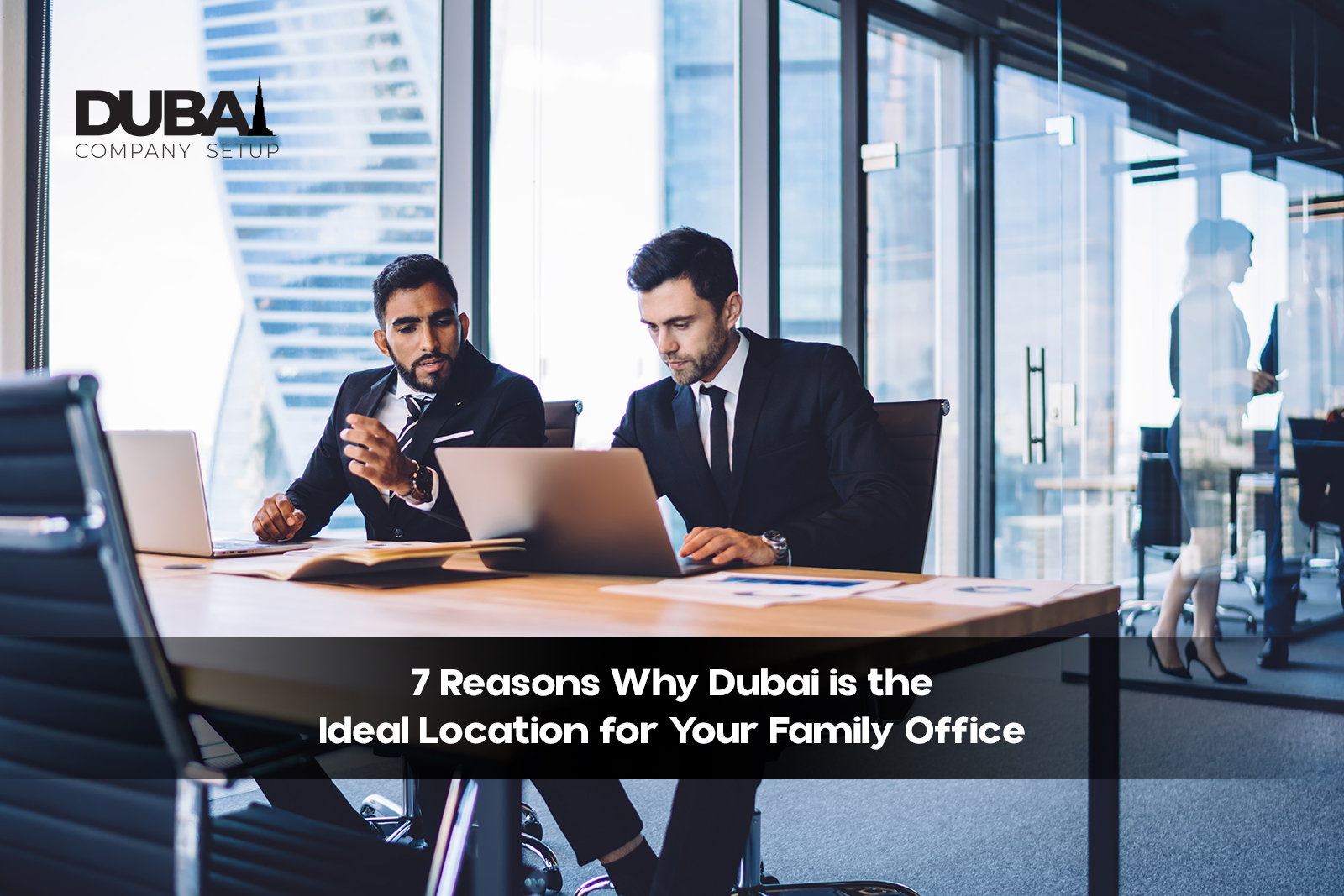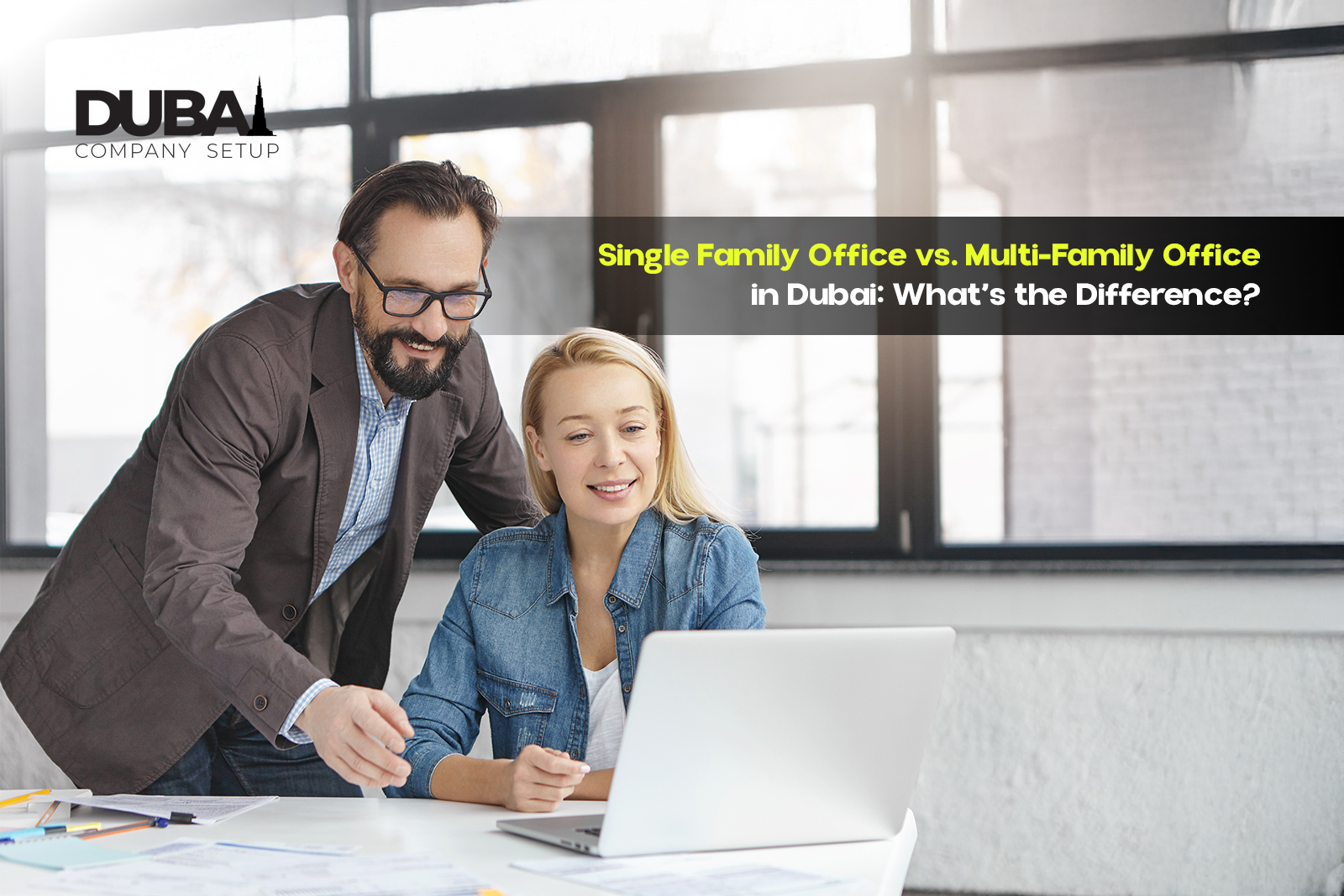Dubai has rapidly become a global hub for family offices, attracting high-net-worth families seeking effective wealth management solutions. Whether you’re managing a vast fortune or planning to secure your family’s financial future, understanding the difference between a Single Family Office (SFO) and a Multi-Family Office (MFO) in Dubai is crucial. These two types of family offices offer distinct structures, benefits, and services tailored to different needs.
What this really means is that choosing the right family office setup can impact how your wealth is preserved, grown, and managed across generations. In this article, we’ll break down the key differences between SFOs and MFOs, explore their benefits, and guide you through licensing and regulatory aspects unique to Dubai.
By the end, you’ll have a clear picture of which family office type aligns best with your goals, helping you make an informed decision for your family’s future.
So, let’s get started.
Understanding Single Family Offices (SFO) in Dubai
A Single Family Office (SFO) is a private wealth management firm established to serve a single ultra-high-net-worth family exclusively. In Dubai, SFOs have become increasingly popular among wealthy families who want full control over their wealth and personalised service tailored to their unique financial goals.
The key benefits of a Single Family Office in Dubai include complete control over investment decisions and wealth management strategies. Families can customise every aspect of the office, from staffing to service offerings, ensuring privacy and confidentiality. Unlike shared models, an SFO dedicates resources solely to one family, allowing for deeper alignment with the family’s vision and values.
Structurally, an SFO operates as a standalone entity, often with its own legal framework, employees, and governance systems. This contrasts sharply with Multi-Family Offices, which pool resources to serve multiple families. In Dubai, this distinction is crucial since the regulatory landscape allows SFOs to operate with greater discretion, often favoured by families looking to maintain tight control over their assets.
Typical services provided by SFOs in Dubai go beyond investment management. They include tax planning, legal advisory, estate and succession planning, lifestyle management (such as concierge services and philanthropy coordination), and risk management. This comprehensive approach ensures that every aspect of the family’s wealth and legacy is cared for under one roof.
Families opting for an SFO in Dubai usually have substantial wealth, often starting at $100 million or more and a desire for complete autonomy over their financial affairs. Business-owning families or those with complex wealth structures frequently choose SFOs to maintain privacy and build a legacy on their own terms.
What is a Multi-Family Office (MFO) and How Does it Work?
A Multi-Family Office (MFO) is a wealth management firm that serves multiple high-net-worth families under one roof, pooling resources to provide expert services at a shared cost. In Dubai, MFOs have gained traction as a cost-effective alternative for families who want professional management without the expense of running a dedicated office.
The core advantage of a multi-family office in Dubai lies in its shared expertise and broad service portfolio. By serving several families, MFOs can afford top-tier specialists in investment advisory, tax, legal, and lifestyle services. This model offers families access to sophisticated wealth management solutions at a fraction of the cost of an SFO.
Governance and decision-making in an MFO are more collaborative. Unlike an SFO where one family controls every decision, MFO clients benefit from a governance structure that balances individual family needs with collective management. This means less customization but greater operational efficiency and risk diversification.
One clear benefit of MFOs is cost sharing, making high-quality wealth management accessible to families with moderately complex needs or smaller asset bases, typically starting around $20 million. However, the trade-off is less privacy and exclusivity compared to SFOs.
For example, consider two Dubai-based families using the same MFO to manage their portfolios, estate plans, and philanthropy. While each family receives tailored advice, the office leverages common infrastructure and expert teams, reducing costs while maintaining quality service.
MFOs are ideal for families seeking professional management but who don’t want the full operational burden or expense of a dedicated family office. They also work well for families who value networking opportunities and shared knowledge that comes from being part of a multi-family environment.
Side-by-Side Comparison: Key Differences Between SFO and MFO in Dubai
When deciding between a Single Family Office (SFO) and a Multi-Family Office (MFO) in Dubai, it is helpful to understand how they differ across several key factors. This Dubai family office types comparison highlights the main distinctions to consider before setting up.
Structure:
An SFO is a standalone entity dedicated to managing the wealth of a single family. It typically involves a tailored team, governance, and operational framework customised to the family’s unique needs. In contrast, an MFO serves multiple families simultaneously, pooling resources to provide shared infrastructure and expert services. This difference in structure directly affects how services are delivered and the degree of personalisation. Understanding the single vs multi-family office structure in the UAE helps families align with the right operational model.
Cost:
Cost is often the first consideration. Setting up and running an SFO in Dubai requires a significant investment, often suitable only for families with assets exceeding $100 million due to the high operational expenses. MFOs offer a more affordable option by distributing costs among several families, making sophisticated wealth management accessible to those with lower asset thresholds, typically starting around $20 million.
Control and Decision-Making:
With an SFO, the family retains full control over investment choices, governance, and service customisation. This level of control appeals to families wanting a hands-on approach and absolute privacy. MFO clients, on the other hand, share decision-making frameworks with other families, which can limit customisation but introduce operational efficiencies.
Privacy:
Privacy is a key consideration in the differences between SFO and MFO in the UAE. SFOs provide the highest level of confidentiality since the office serves only one family. MFOs, while still secure, naturally involve a more open environment due to shared resources, which may not suit families with strict privacy requirements.
Service Customisation:
SFOs excel at customisation, offering bespoke services that cover everything from investment strategy to family governance, philanthropy, and lifestyle management. MFOs provide a broad service portfolio but with less scope for individual tailoring, as they balance the needs of multiple families.
Regulatory Considerations:
Both SFOs and MFOs must navigate Dubai’s evolving framework for family office licensing and compliance. SFOs often benefit from more flexible regulatory treatment given their private nature, while MFOs must adhere to stricter rules due to the shared client base. Understanding these licensing nuances is essential when planning an SFO or MFO setup in Dubai.
Scalability:
MFOs inherently offer greater scalability, allowing families to access expanding services without the burden of increased operational costs. SFOs may face scalability challenges as growing complexity demands more resources and infrastructure.
Impact on Wealth Management Outcomes:
These differences translate directly into how wealth is preserved and grown. SFOs provide highly personalised strategies that align tightly with family values and long-term goals. MFOs offer professional expertise and diversified resources but with less personal control, making them ideal for families seeking efficiency over exclusivity.
Recent Trends in the UAE Family Office Space:
Dubai’s family office sector is evolving fast. Recent regulatory updates aim to attract more family offices, with incentives favouring both SFO and MFO setups. Increasingly, families are blending models—starting with MFOs to test the waters and moving toward SFOs as their needs become more complex. The city’s growing reputation as a wealth hub means options will only expand.
Licensing and Regulatory Landscape for Family Offices in Dubai
Setting up a family office in Dubai requires careful navigation of licensing and regulatory requirements, which differ based on whether you opt for a Single Family Office (SFO) or a Multi-Family Office (MFO). Understanding the Dubai SFO and MFO licensing requirements is critical to ensure compliance and smooth operations.
For SFOs, Dubai offers a relatively streamlined licensing process. Since an SFO manages wealth exclusively for one family, regulatory authorities often apply lighter oversight compared to commercial financial firms. However, the SFO still needs to meet basic licensing standards, such as proof of substantial family wealth, governance structures, and adherence to anti-money laundering (AML) laws. Licensing for SFOs can be obtained through different jurisdictions in Dubai: the Dubai International Financial Centre (DIFC), the Abu Dhabi Global Market (ADGM), or the Dubai mainland. Each has its own setup steps, timelines, and cost structures, with DIFC and ADGM offering more established frameworks specifically tailored for family offices.
In contrast, MFOs face stricter regulatory scrutiny because they serve multiple families and operate more like traditional wealth management firms. This means MFOs must comply with comprehensive financial regulations, including licensing, reporting, and ongoing audits. Regulatory authorities expect MFOs to have robust compliance frameworks due to their broader client base.
When considering an SFO or MFO setup in Dubai, families should factor in jurisdictional benefits. DIFC and ADGM often provide more favourable tax regimes and legal protections, but mainland Dubai can offer operational flexibility depending on the business model.
Recent updates from Dubai’s financial regulators have further clarified the licensing requirements for family offices, making the process more transparent. These developments make Dubai an increasingly attractive hub for both SFOs and MFOs seeking to establish a compliant and efficient base.
How to Choose Between an SFO and MFO in Dubai?
Deciding which family office type to choose in Dubai hinges on several key factors, from family size to wealth complexity and long-term objectives. Here’s a practical guide to help families make an informed choice.
Family Size and Wealth Complexity:
If you represent a single, ultra-wealthy family with assets exceeding $100 million and complex financial structures, an SFO often makes the most sense. It offers complete control and customised solutions tailored to your family’s unique needs. For smaller families or those with less complex wealth, an MFO provides professional management without the full operational burden of running a dedicated office.
Desired Control and Privacy:
SFOs give families exclusive control over investments and governance, appealing to those who prioritise privacy and autonomy. MFOs, while secure, involve shared infrastructure and governance, which may not suit families wanting total discretion.
Budget Considerations:
Running an SFO involves higher setup and operational costs. Families mindful of budget constraints may find an MFO’s cost-sharing model more practical without sacrificing the quality of service.
Long-Term Goals:
Consider your family’s future plans. If building a lasting legacy with hands-on involvement is important, an SFO provides that platform. If you prefer to delegate wealth management to experts while benefiting from economies of scale, an MFO is a strong choice.
Questions to Ask Before Deciding:
- What level of control and customisation do we require?
- How much are we willing to invest in running the office?
- What privacy standards are non-negotiable?
- How complex are our wealth management needs?
- What jurisdictions and licensing frameworks align best with our goals?
Ultimately, professional advice is invaluable. Consulting family office specialists in Dubai can help clarify licensing nuances, costs, and operational implications, ensuring you choose the right path aligned with your family’s vision.
Choosing between a Single Family Office (SFO) and a Multi-Family Office (MFO) in Dubai comes down to your family’s unique needs, priorities, and long-term goals. While SFOs offer full control, customization, and privacy ideal for ultra-high-net-worth families, MFOs provide cost-effective, professional wealth management suited for families seeking shared expertise and efficiency. Understanding the regulatory landscape, cost implications, and service structures is essential to making the right decision.
What this really means is that there’s no one-size-fits-all solution. Your choice should reflect the complexity of your wealth, desired level of involvement, and budget. To navigate these options confidently and ensure compliance with Dubai’s licensing requirements, it’s wise to consult with experts who specialise in family office setups.
At Dubai Company Setup, we guide families through every step of establishing their ideal family office – whether it’s an SFO or MFO. Reach out today to explore your options and secure a future-proof wealth management solution tailored just for you.











